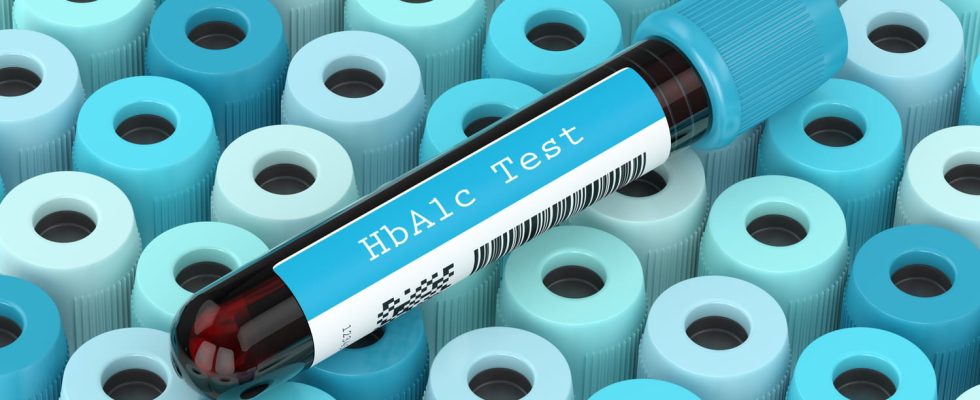Glycated hemoglobin (HbA1c) assesses blood glucose control over the past 3 months. The higher the blood sugar level over this period, the higher the glycated hemoglobin value.
Definition: what is glycated hemoglobin?
Glycated hemoglobin (or HbA1c) allows to’assess blood sugar control over the last 3 months. This dosage also reflects the risks of long-term complications. We can consider glycated hemoglobin as the blood sugar control memory, unlike blood sugar which provides information at a given moment. The higher the sugar level in the blood over the last three months, the higher the glycated hemoglobin value will be. “It is the best marker of glycemic balance ; it is widely used in current medical practice in the monitoring of diabetes., explains Dr Yves Fouré, general practitioner. To know that it is not no need to fast for the analysis of glycated hemoglobin.
What is the difference between glycated hemoglobin and hemoglobin?
Glycated hemoglobin and hemoglobin have nothing to do with each other since hemoglobin is the main constituent of red blood cellswhich has the function of transporting oxygen to the cells.
What is the normal level of glycated hemoglobin?
The determination of glycated hemoglobin is done using a blood test. “We consider that diabetes is balanced if the level of glycated hemoglobin is between 6 and 7%, according to age.” Beyond this, diabetes is considered unbalanced and the risk of long-term complications increases.
High level: what causes glycated hemoglobin to increase?
An increase in the HbA1c level is linked to a excess glucose in the blood. This happens when the amount of insulin in the blood is insufficient. We are then in a situation hyperglycemiawith the following potential symptoms: fatigue, copious urine, intense thirst and hunger, dizziness, etc.
► The increase in the level of glycated hemoglobin may be linked to an diet excessively high in carbohydrateshas a insufficient dosage of medications anti-diabetics or even a insufficient insulin intake. “Stress and infections can also increase blood sugar levels, which will therefore cause an increase in glycated hemoglobin. However, this phenomenon is ephemeral”adds Dr Fouré.
What does low glycated hemoglobin mean?
An abnormally low level of glycated hemoglobin also suggests an imbalance of diabetes. “This may be due to drug overdose anti-diabetics. It is then necessary to readjust the treatment.” The symptoms are then those of hypoglycemia (palpitations, hot flashes, nausea, etc.).
What to do when the glycated hemoglobin level is abnormal?
When the attending physician or diabetologist notes an abnormal increase (or decrease) in glycated hemoglobinit is necessary that rehabilitate diabetes treatment (metformin, glitazones, sulphonylureas, glinides, dipeptidyl peptidase-4 inhibitors, GLP-1 analogues). “We are reviewing the doses in order to rebalance the diabetes and avoid long-term consequences.”
Thanks to Dr Yves Fouré, general practitioner in La Rochelle.
